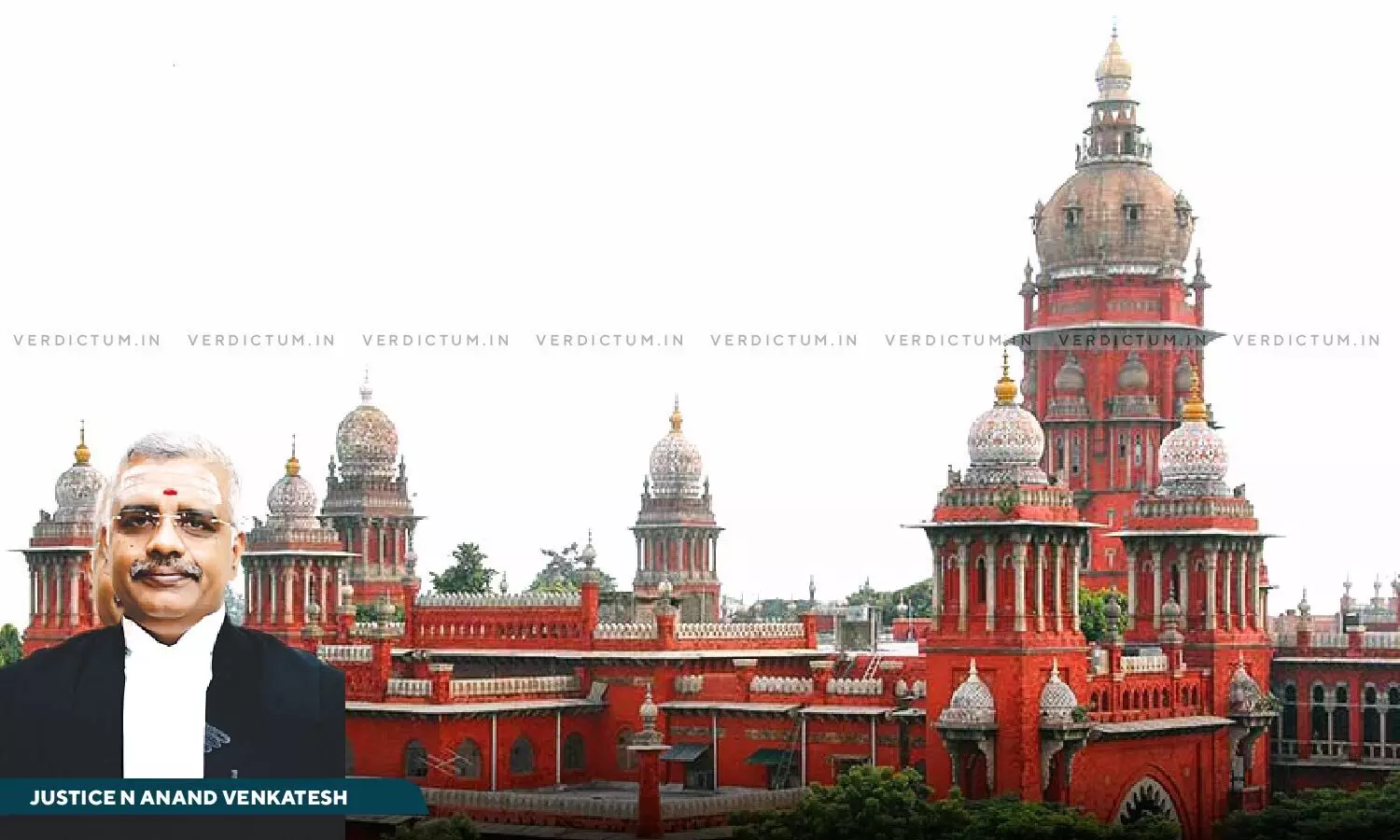
Justice N. Anand Venkatesh, Madras High Court
"Two Petals On One Stem, Both Seek Lord Venkateswara Perumal": Madras High Court Appeals For Unity & Peace Between Vadakalai & Thenkalai Vaishnava Sects
 |
|The Madras High Court also noted that the division that arose during the15th Century resulted in the devotees falling under two Sects called the Thenkalai and the Vadakalai.
Calling the Vadakalai and Thenkalai sects two petals on one stem, the Madras High Court has urged for peace between both sects while considering the dispute relating to the recital of Prabhandham outside the Vilakkoli Temple.
The Petition before the High Court was filed under Article 226 of the Constitution seeking a direction to the respondents to ensure that services, customs and rituals of the Vilakkoli Temple are observed and followed by recognising the rights of the petitioners and Thenkalai devotees to recite Prabhandham by leading the procession and involving recital of only Thengalaimantram and Thengalaivazhithirunamam without any interference by anybody in all processions outside the Vilakkoli Temple.
The Single Bench of Justice N. Anand Venkatesh penned down these words,“Vadakalai and Thenkalai, two petals on one stem,
both seek Lord Venkateswara Perumal,
both belong to Him.
In the name of Acharyas, the quarrels still ignite,
yet, those wise souls now bask in the Lord's pure light.
Their journeys ended at His lotus feet so grand, while we, their children, still draw lines in the sand.
Let us honour their path, let old divisions cease -
and walk together united in faith and peace.”
Senior Counsel P.V.Balasubramaniam represented the Petitioners while Government Advocate K. Karthikeyan represented the Respondents.
Factual Background
The Petitioners belong to the Thenkalai Sect of Shri Vaishnavites of Kanchipuram, having Adhyapaka Mirasi rights in the Vilakkoli Perumal Sri Vedhantha Desikar Thirukoil at Kanchipuram. The Vilakkoli Temple is one of the 18 Divyadesams located in and around Kanchipuram, venerated by the Vishnavites. Amongst the followers of Ramanujacharya, a division arose which resulted in the devotees falling under two Sects called the Thenkalai and the Vadakalai. A serious dispute arose between the two Sects as to how the Prabhandhams had to be recited and should be adopted in the temples. As per an earlier judgment, the Vadakalai Sect was restrained from reciting their Mantrams and Prabhandhams by forming a separate Goshti in front of the deity or by interposing between the idol and the Vedic Goshti.
Even though the right of the Thenkalais to recite Divya Prabhandham outside the temple was recognised and allowed, and it was also conceded in the earlier proceedings, an attempt was made to stop the Thenkalais from reciting Prabhandhams even outside the temple. This resulted in a representation made to the second respondent- Executive Officer, who, by the impugned communication, refused to permit the Thenkalais from reciting Prabhandham even outside the temple during the procession. This was put to the challenge in the present writ petition.
Reasoning
The Bench was of the view that the impugned letter of the Executive Officer that was put to challenge couldn’t be faulted by the petitioners since the second respondent had taken into consideration the repeated clashes that took place between the Thenkalais and Vadakalais during festive occasions, and the Officer did not want any breach of peace. It was further noticed that during such occasions, the persons belonging to the Thenkalai and the Vadakalai Sects had come to blows for their fervour to establish the superiority of their respective Acharyas. Therefore, the Officer wanted to avoid such a volatile situation during an occasion which needed to be celebrated in peace.
The Bench explained that if according to the petitioners, their right to recite Prabhandham outside the temple during the procession and stop the persons belonging to the Vadakalai Sect from reciting the verses in praise of Swami Vedhantha Desikar, was recognized by the second respondent and the Sabha in the previous round of litigation, that couldn’t be a ground to file yet another writ petition before the Court to enforce the same. As per the Bench, that might have been a ground for filing a petition before the competent civil court to execute the decree.
Considering that the dispute arose in the Vilakkoli Perumal Sri Vedhantha Desikar Thirukoil at Kanchipuram, the Bench noted that the temple has been administered and managed by the devotees belonging to the Vadakalai Sect for decades together. It was further noticed that persons belonging to the Thenkalai Sect did not take any steps to exercise their right conferred on them by the decree, and hence, in the earlier order, it was held that they waived/abandoned their right.
The Bench, thus, held, “Under the given situation, if really the devotees belonging to the Thenkalai Sect want to participate in the procession in a peaceful manner, they must participate in the procession at the time of reciting Divya Prabhandham, which is common for both the Thenkalai and the Vadakalai Sects. Instead of attempting to project the respective Acharyas even above Lord Venkateshwara, which formed the basis for the dispute between both sides, at some point of time, one of the parties has to rest in abiding by the rule of law and making the entire event peaceful, which is the objective of any religion.
Finding no ground to interfere with the impugned judgment, the Bench dismissed the same.
Cause Title: Thenkalais v. The Commissioner, Hindu Religious & Charitable Endowment Department (Neutral Citation: 2025:MHC:1381)
Appearance
Petitioner: Senior Counsel P.V.Balasubramaniam, Advocate Varuni Mohan
Respondent: Government Advocate K. Karthikeyan, Advocate R. Bharanidharan, Senior Counsel G. Rajagopalan, Senior Counsel Satish Parasaran, Advocate Abhinav Parthasarathy, Senior Counsel V. Raghavachari, Advocate V. Nittilakshan, Senior Counsel T. Mohan, Advocate Palaniandavan, Senior Counsel Hema Sampath, Advocate R. Meenal, Senior Counsel T.V. Ramanujam, Advocates R. Ramya, S.J. Krishnan, N.V. Balaji